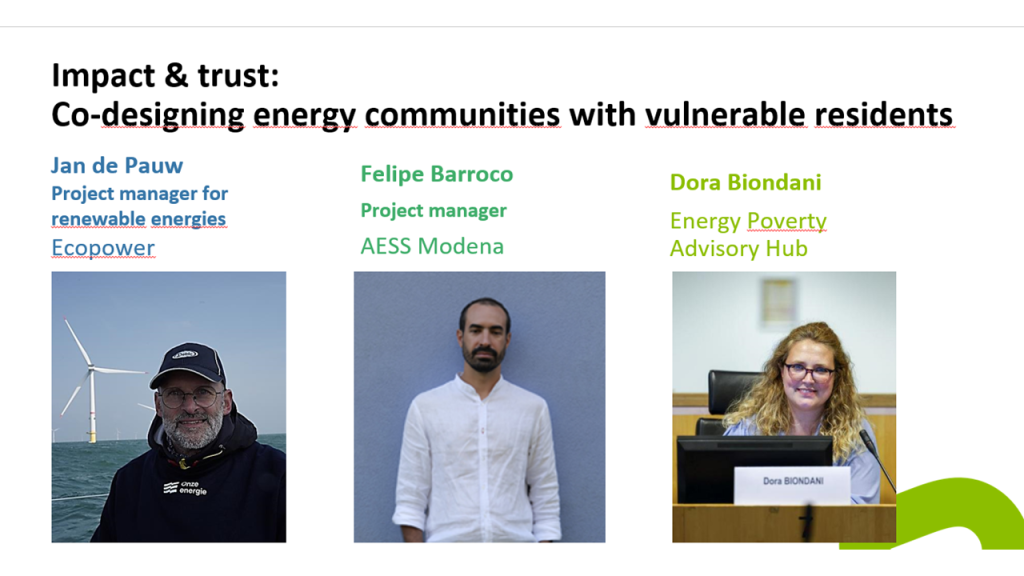by Marine Cornelis, NextEnergy Consumer
In the final webinar of the POWER UP series, participants came together to explore how trust, co-creation, and local partnerships can drive successful community energy models with vulnerable households. The session, moderated by Marine Cornelis, focused on two pilots from Campania (Italy) and Eeklo (Belgium); both developed in complex local contexts but united by a common goal: ensuring renewable energy benefits reach those most in need.
▶️ Watch the replay https://www.youtube.com/watch?v=zVQ5m5o34ns

Miriam Eisermann (Energy Cities) opened with a quote from Donella Meadows: “The scarcest resource is not oil, metals, clean air, capital, labour, or technology. It is our willingness to listen to each other.” This ethos shaped POWER UP’s co-creation journey from 2021 to 2025. As Miriam put it, “We tried to listen, especially to those who are usually in the blind spot of energy service design.”
Campania (Italy): Building from scratch amid uncertainty
Felipe Barroco of AESS Modena described how the Italian pilot evolved under difficult conditions. Originally led by UCSA, the project faced delays and political instability. AESS stepped in to support implementation across four municipalities, focusing on two: Palma Campagna and San Giuseppe Vesuviano.
The Italian team set off to organize a series of co-creation workshops with people in vulnerable situations. Early engagement proved challenging: “We had some persons interesting during the initiatives, more or less 10, 15 in each meeting, but from the specific buildings, one or two.” Felipe noted the importance of adapting strategies: they refurbished unused public PV systems and revived legal processes to connect them to the grid. One key outcome was the formation of a foundation to manage a 400 kW solar project on confiscated land, “a dumping field in the hands of the mafia in the past”, now repurposed for social good.
Many ways to communicate with the specific, most targeted population were used. Crucially, “the game-changer was the use of WhatsApp for invitations,” alongside support from trusted associations like RETE ASSIST. A local one-stop shop now provides weekly energy and consumer advice. As Felipe summed up: “Working with behaviour change and small solutions that can provide some savings is the best way to go forward.”
Eeklo (Belgium): Translating cooperative values into action
Jan de Pauw from Ecopower presented Eeklo’s pilot, anchored in a strong tradition of cooperative energy. Following a series of workshop led by a expert-by-experience, i.e. someone who had experienced energy poverty herself, the city had its first business scheme ready: it decided to pre-finance €250 shares in the local energy cooperative for 100 vulnerable households. These social shares gave members access to energy at cost and participation in a structured savings plan with 3 EUR/month to be paid by the beneficiary: “After six years, the savings plan of €250 is reached and the city gets back the pre-financed part.”
Yet the pilot faced legal barriers: “More than 90% of the people supplied by the [distribution system operator] had debt and we couldn’t reach them because of the law.” The team shifted focus to those recently removed from Belgium’s social tariff scheme. Still, many opted for marginally cheaper commercial offers. To bridge this, Ecopower deployed plug-in PV panels: “All participants get a plug-in solar panel of 500 watts… They easily can save 10-15% of electricity they no longer need from the grid.”
Jan emphasised the social effort required: “Trust is the most important thing, and we looked for the people they already know, connected to the municipality and social organisations.”
EU reflections: Trust and time go hand-in-hand
Dora Biondani (EPAH) commented the pilots’ resilience: “When we’re talking about vulnerable consumers, it’s key to understand how to engage them… and have a realistic understanding of cultural and traditional contexts.” She highlighted the time investment needed for meaningful participation: “The technical part is never the main obstacle. Trust is.” Check the EPAH methodology.
Key takeaways
- Co-creation is not a luxury; it is essential. Both projects adapted their models to community needs and capacity.
- Trust is earned through consistency, transparency, and informal, localised outreach.
- Legal frameworks must evolve to allow energy access for indebted or precarious households.
- Energy communities can act as social welfare actors, not just energy providers.
As Marine Cornelis closed the session: “Fighting energy poverty means starting where people are, not where we wish them to be… Trust is built on actions, not words.”
The lessons from Campania and Eeklo offer inspiration for municipalities across Europe. With flexibility and local partnerships, energy communities can become engines of social justice.
You may also have a look at our latest Report on Communication Campaigns towards households in vulnerable situations “Communication as a gateway to trust”.
